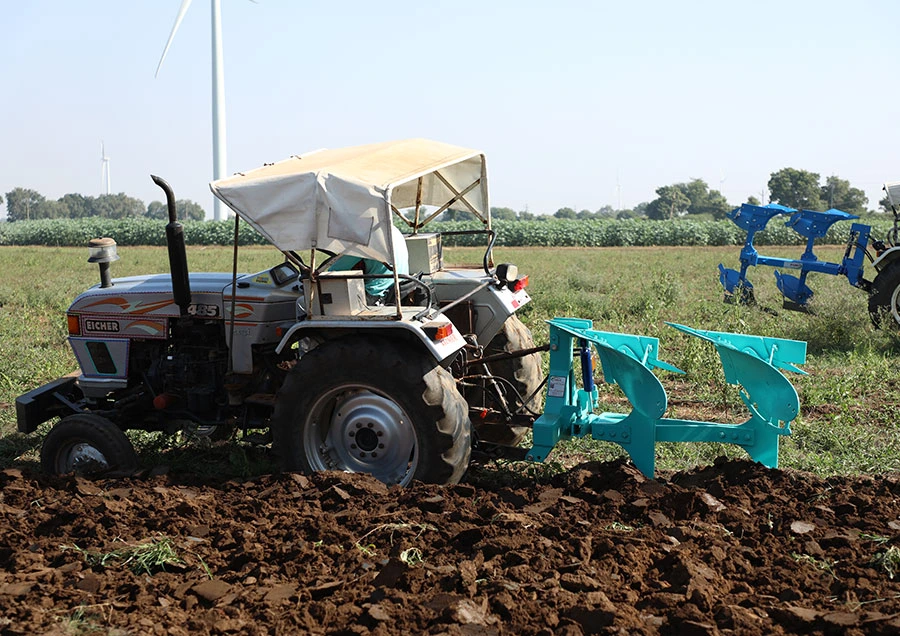Chat With Us
+91 99253 37969Cultivator vs Rotavator: Understanding the Differences

When it comes to preparing soil for planting, the right equipment makes all the difference. Cultivators and rotavators are two of the most commonly used tools in agriculture and gardening for soil preparation. Although these terms are often used interchangeably, they refer to different types of equipment, each with its own unique functions and benefits.
Understanding the difference between a cultivator and a rotavator helps you choose the right tool for your needs, whether you're a home gardener or a farmer.
Cultivator vs. Rotavator: What Is the Difference?
1. What Is a Cultivator?

A cultivator is a versatile agricultural tool used primarily for soil preparation, weed control, and mixing soil amendments. Cultivators come in various sizes, from small hand-held models for garden beds to large, tractor-mounted units for farming.
Functionality:
Soil Aeration: Cultivators are designed to break up the soil's surface layer, which helps to aerate the soil and promote healthy root growth.
Weed Control: By disturbing the soil, cultivators uproot weeds and prevent them from taking hold, which is especially useful in vegetable gardens and flower beds.
Soil Mixing: Cultivators mix in soil amendments, such as compost or fertilizers, ensuring that nutrients are evenly distributed throughout the soil.
Types of Cultivators:
Hand-Held Cultivators: These are small tools, often with a handle and rotating tines, ideal for light gardening tasks.
Electric or Gas-Powered Cultivators: These are more powerful and suitable for larger gardens or small plots of land.
Tractor-Mounted Cultivators: Used in large-scale farming, these heavy-duty machines are attached to tractors and cover vast areas of land efficiently.
2. What Is a Rotavator?

A rotavator, also known as a rotary tiller or rototiller, is a more heavy-duty piece of equipment used for deeper soil cultivation. Rotavators are typically powered by an engine and are designed to break up and turn over the soil, making them ideal for preparing new plots of land for planting.
Functionality:
Deep Soil Tilling: Rotavators dig deep into the soil, breaking up hard ground and turning it over. This deep tilling helps to prepare the soil for planting by loosening it and improving drainage.
Land Preparation: Rotary tillers are particularly useful for preparing large areas of land, such as fields or new garden beds, where the soil is compacted or has never been cultivated before.
Incorporating Organic Matter: Rotavators mix organic matter, like compost or manure, into the soil at a deeper level, which enhances soil fertility and promotes healthy plant growth.
Types of Rotavators:
Mini Rotavators: These are smaller, lighter machines suitable for home gardeners who need to till small plots or garden beds.
Medium Rotavators: Ideal for medium-sized gardens or allotments, these machines offer more power and handle tougher soil conditions.
Heavy-Duty Rotavators: Designed for professional use, these rotary tillers are capable of tilling large fields and are often used in farming.
3. Key Differences Between Cultivators and Rotavators
While both cultivators and rotavators are used for soil preparation, there are several key differences between the two tools:
Depth of Tillage:
Cultivators: Typically till the top few inches of soil, making them ideal for shallow soil preparation, weed control, and mixing soil amendments.
Rotavators: Dig much deeper into the soil, often up to 8-12 inches, which makes them suitable for breaking up hard, compacted soil and preparing new plots of land.
Purpose:
Cultivators: These are mainly used for light soil preparation tasks, such as aerating the soil, controlling weeds, and mixing in nutrients. They are best suited for maintaining already cultivated soil.
Rotavators: These are used for heavy-duty tasks, such as breaking new ground, preparing large areas for planting, and incorporating organic matter into the soil at a deeper level.
Power and Size:
Cultivators: Come in a range of sizes, from small, hand-held tools to larger, motorized versions. They are generally lighter and easier to operate than rotavators.
Rotavators: These are more powerful and larger, with engines that handle tough, compacted soil. They require more effort to operate and are typically used for larger-scale soil preparation.
Soil Impact:
Cultivators: Cause minimal disruption to the soil structure, making them ideal for maintaining healthy soil and promoting good plant growth.
Rotavators: Disturb the soil more extensively, which be beneficial for breaking up compacted soil but may also disrupt the soil ecosystem if overused.
4. Choosing the Right Tool for Your Needs
When deciding between a cultivator and a rotary tiller, consider the following factors:
Size of the Area:
For small gardens, flower beds, or vegetable patches, a cultivator is usually sufficient. It’s lighter, easier to handle, and perfect for maintaining already cultivated soil.
For larger areas, such as new garden plots, fields, or areas with compacted soil, a rotavator is the better choice. Its power and depth of tillage make it ideal for preparing the land for planting.
Soil Condition:
If your soil is loose, well-aerated, and free of hard clumps, a cultivator will be able to handle the task effectively.
If your soil is compacted, hard, or hasn’t been worked on before, a rotary tiller will be more effective in breaking up the soil and making it suitable for planting.
Frequency of Use:
If you need a tool for regular maintenance, such as weed control and soil aeration, a cultivator is the better option.
If you’re preparing large plots of land once or twice a year, a rotavator is more appropriate.
Conclusion
Both cultivators and rotavators are valuable tools in soil preparation, each serving different purposes depending on the task at hand. Understanding the differences between these tools helps you choose the right equipment for your specific needs, ensuring that your soil is perfectly prepared for planting.
Selecting the appropriate tool will save you time, and effort, and ensure a successful growing season.





